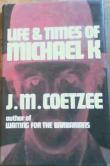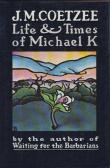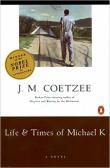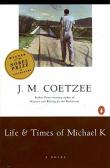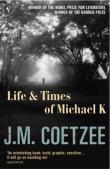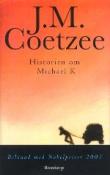AustLit
Latest Issues
AbstractHistoryArchive Description
"From the author of Waiting for the Barbarians, another startling and disturbing portrait of today's South Africa, a land and a people beset by violence and siege. Coetzee here tells the story of a handicapped young man who has worked as a municipal gardener in Cape Town. His mother is dying, and she wishes to return to her birthplace out in the veldt. Without the required transit passes, mother and son set out on a journey that will end in death for her and in a new but temporary life on an abandoned farm for him. His respite in isolation and peace does not last long, however; grotesque reality soon returns to trouble this quiet new world. Against the solitude of this private drama, Coetzee paints an eloquent and pained picture of his homeland and of the bureaucrats, doctors, army deserters, and camp guards who reveal the stress and qualms of their existence and who uneasily sense that there is no conclusion to their troubles and no future for their lives." (Source: Libraries Australia)
Notes
-
Epigraph:
War is the father of all and king of all.
Some he shows as gods, others as men.
Some he makes slaves, and others free.
-
Editions and translations have been updated for Life & Times of Michael K by Eilish Copelin as part of a Semester 2, 2013 scholar's internship. The selection and inclusion of these editions and translations was based on their availability through Australian libraries, namely through the search facilities of Libraries Australia and Trove (National Library of Australia).
Given the international popularity of Coetzee's work, however, this record is not yet comprehensive. Editions and translations not widely available in Australia may not have been indexed. Furthermore, due to the enormous breadth of critical material on Coetzee's work, indexing of secondary sources is also not complete.
Publication Details of Only Known VersionEarliest 2 Known Versions of
Other Formats
- Also sound recording and large print.
Works about this Work
-
Life and Times of Michael K
2023
single work
criticism
— Appears in: The Bloomsbury Handbook to J. M. Coetzee 2023; (p. 103-114) -
y
 J.M. Coetzee’s Life and Times of Michael K at Forty
Southbank
:
Australian Book Review, Inc.
,
2023
26766125
2023
single work
podcast
J.M. Coetzee’s Life and Times of Michael K at Forty
Southbank
:
Australian Book Review, Inc.
,
2023
26766125
2023
single work
podcast
'On this week’s ABR podcast, critic and essayist James Ley reflects on J.M. Coetzee’s Life and Times of Michael K, forty years after its publication. Coetzee’s fourth and Booker Prize-winning novel was his landmark work, explains Ley. This was despite it receiving criticism for supposedly eliding the political realities of Apartheid South Africa by being set in ‘the realm of allegory’. Listen to James Ley with ‘An obscure prodigy: J.M. Coetzee’s Life and Times of Michael K at forty’, published in the August issue of ABR.'
-
An Obscure Prodigy J.M. Coetzee’s 'Life and Times of Michael K' at Forty
2023
single work
essay
— Appears in: Australian Book Review , August no. 456 2023; (p. 50)'These are the words of Mrs Curren, the elderly narrator of J.M. Coetzee’s under-appreciated mid-period novel Age of Iron (1990), but it would be easy enough to find similarly anguished sentiments being expressed by the Magistrate in Waiting for the Barbarians (1980), or Dostoevsky in The Master of Petersburg (1994), or David Lurie in Disgrace (1996), or the eponymous protagonist of Elizabeth Costello (2003). It has long been apparent that there is a recognisable Coetzeean type, who appears in various guises in his many novels. These characters tend to be educated products of their relatively privileged social positions. They are conscious of the pain and injustice in the world, conscious of their own suffering, and conscious of their impotence in the face of overmastering contexts. Their common instinct is to philosophise about these problems. Many ironies, gruelling and subtle, arise from their desire for redemption and their simultaneous awareness of its impossibility, not least of which is that their penchant for metaphysical high-mindedness has a distinct tendency – on display in Mrs Curren’s lament – to bend back on itself in a way that resembles self-absorption or even self-pity.' (Introduction)
-
Coetzee's Carcer[e]al State : Michael K as Hunter-Gatherer
2022
single work
criticism
— Appears in: Ariel : A Review of International English Literature , October vol. 53 no. 4 2022; (p. 65-90) 'In Life & Times of Michael K, J. M. Coetzee appears thoroughly persuaded by those anthropological theories—still emerging at the time of the novel's publication—that were reconceiving hunter-gatherer bands as happier, healthier, better-fed, more leisured, and less socially stratified communities than the permanent settlements of agriculturalists. By depicting Michael as a nutritionally and spiritually satisfied forager upon the karoo and by figuring the labor camps in which he is intermittently confined as epitomes of the Neolithic (and subsequent) grain state, Coetzee endorses those intellectual currents that have now supplanted the optimistic narrative of the Agricultural Revolution with that of the Agricultural Trap. In short, the novel figures the adoption of farming as a hedonic catastrophe for the great mass of humankind. Thus, critics who register their disappointment with the novel's supposed political quietism have failed to grasp the text's longue durée concerns or to realize that Michael refuses to aid the guerillas because their victory would only impose upon him a different version of agro-culture. By the same token, many critics' insistence that Michael is a vaguely allegorical figure offering some unrealizable alternative lifeway is refined into sharper focus by the revelation of his anthropological specificity.'(Publication abstract)
-
False Generosity of the State: Parasitic Subjectivity in J. M. Coetzee's 'Life and Times of Michael K'
2019
single work
criticism
— Appears in: Anglia : Zeitschrift fur Englische Philologie , September vol. 137 no. 3 2019; 'This paper holds that J. M. Coetzee’s novel, Life and Times of Michael K, demonstrates how apartheid, in order to preserve its domination over the nonwhite population of South Africa, as with other authoritarian regimes, commonly encouraged dependency. Its various institutions and camps aimed precisely to create a culture of dependence and to fashion subjects utterly dependent on the state. A dependent subject is a powerless, exploitable, and controllable subject; this is the right kind of subject for colonizers. The black majority of South Africa, then, could only have a parasitic existence, completely dependent on their white masters. The novel narrates how dependence is created through the false generosity of the state. As Paulo Freire in Pedagogy of the Oppressed argued, false charity is a state strategy that serves to reproduce the relations of domination. Coetzee’s novel, thus, suggests that to undermine the structure of domination, the oppressed have to reject the culture of dependence and the parasitic subjectivity that arise from the false generosity of the state.' (Source: publication abstract)
-
Who’s Appropriating Whose Voice in Coetzee’s Life & Times of Michael K?
2014
single work
criticism
— Appears in: Approaches to Teaching Coetzee's Disgrace and Other Works 2014; (p. 152-159) -
From Dissensus to Inoperativity : The Strange Case of J. M. Coetzee’s Michael K
2016
single work
criticism
— Appears in: English Studies , vol. 97 no. 6 2016; (p. 618-637) 'This article develops a comprehensive reading of Life & Times of Michael K, one of J. M. Coetzee’s most controversial novels, which has provoked strong feelings and an intense debate among critics since its publication in 1983. Scholarly works on the novel have tended to explore the ethical dilemma raised by the enigmatic life of the protagonist and his apparent unrelatedness with its “times”, focusing on the issues of absolute alterity and its (un)representability, while denying any political import to the novel. These interpretations draw on a conformist understanding of politics that transforms the social outsideness of Michael K into his political irrelevance. The argument developed in this article takes instead the reconceptualizations of (emancipatory) politics by Jacques Rancière and Giorgio Agamben as a basis for a thorough political reading of Michael’s outsideness. The notions of “dissensus” and “inoperativity” help to disclose, behind Michael’s apparently unpretentious life, a complex strategy aimed at maintaining his distance from power, while keeping power itself at a distance.' (Publication abstract) -
Eurydice’s Curse : J. M. Coetzee and the Prospect of Death
2018
single work
criticism
— Appears in: Australian Literary Studies , February vol. 33 no. 1 2018;'The prospect of death is one of J. M. Coetzee’s central and enduring concerns. As David Attwell observes in his biography, ‘The most trenchant of the purposes of Coetzee’s metafiction . . . is that it is a means whereby he challenges himself with sharply existential questions’. My claim in this essay is that Coetzee uses the act of writing existentially to orient himself and his readers to the prospect of death. I argue that Coetzee treats the myth of Orpheus and Eurydice as a story about how to deal with the prospect of death. What seems to terrify the Coetzeean protagonist is the thought of the absolute solitariness of death. I call this the curse of Eurydice. Eurydice’s fate in the myth is to be left alone in the Underworld, dying for a second time after her impatient lover turns to gaze at her before they have safely reached the surface of the earth. To take Eurydice’s point of view in the story is to begin to glimpse the solitariness of death. One of the roles of women in Coetzee’s fiction, I suggest, is to mitigate the male character’s fear of this solitariness by conducting him to the threshold of death, but no further.' (Publication abstract)
-
The Fixation on the Womb and the Ambiguity of the Mother in Life & Times of Michael K
2019
single work
criticism
— Appears in: Reading Coetzee's Women 2019; (p. 151-164) -
False Generosity of the State: Parasitic Subjectivity in J. M. Coetzee's 'Life and Times of Michael K'
2019
single work
criticism
— Appears in: Anglia : Zeitschrift fur Englische Philologie , September vol. 137 no. 3 2019; 'This paper holds that J. M. Coetzee’s novel, Life and Times of Michael K, demonstrates how apartheid, in order to preserve its domination over the nonwhite population of South Africa, as with other authoritarian regimes, commonly encouraged dependency. Its various institutions and camps aimed precisely to create a culture of dependence and to fashion subjects utterly dependent on the state. A dependent subject is a powerless, exploitable, and controllable subject; this is the right kind of subject for colonizers. The black majority of South Africa, then, could only have a parasitic existence, completely dependent on their white masters. The novel narrates how dependence is created through the false generosity of the state. As Paulo Freire in Pedagogy of the Oppressed argued, false charity is a state strategy that serves to reproduce the relations of domination. Coetzee’s novel, thus, suggests that to undermine the structure of domination, the oppressed have to reject the culture of dependence and the parasitic subjectivity that arise from the false generosity of the state.' (Source: publication abstract)
Awards
- 1985 winner Prix Femina (France) — Étranger (Foreign Novels)
- 1984 winner Central News Agency Literary Award (CNA Literary Award)
- 1983 winner The Booker Prize


